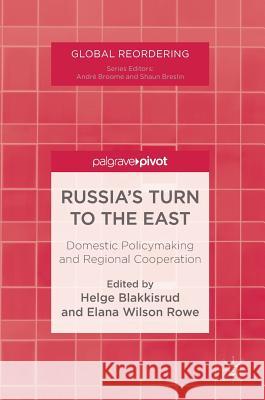Russia's Turn to the East: Domestic Policymaking and Regional Cooperation » książka



Russia's Turn to the East: Domestic Policymaking and Regional Cooperation
ISBN-13: 9783319697895 / Angielski / Twarda / 2018 / 167 str.
Russia's Turn to the East: Domestic Policymaking and Regional Cooperation
ISBN-13: 9783319697895 / Angielski / Twarda / 2018 / 167 str.
(netto: 107,10 VAT: 5%)
Najniższa cena z 30 dni: 107,96
ok. 22 dni roboczych
Dostawa w 2026 r.
Darmowa dostawa!
This book is open access under a CC BY license.This book explores if and how Russian policies towards the Far East region of the country - and East Asia more broadly - have changed since the onset of the Ukraine crisis and Russia's annexation of Crimea.
Chapter 1. Gateway or garrison? Border regions in times of geopolitical crisis (Helge Blakkisrud and Elana Wilson Rowe)
Chapter 2. An Asian pivot starts at home: The Russian Far East in Russian regional policy (Helge Blakkisrud)
Backdrop: post-1991 management of centre–region relations
The Ministry for the Development of the Far East
Institutional environment
Ministry for the Development of the Far East: successes and pitfalls
Chapter 3. Primorskii Krai and Russia’s ‘turn to the East’: A regional view (Tamara Troyakova)
Budgetary, administrative, legislative and policy changes
Economic development zones in Primorskii Krai
Far Eastern Hectare
Developing infrastructure
Primorye’s regional economic diplomacyChapter 4. Promoting new growth: ‘Advanced special economic zones’ in the Russian Far East (Jiyoung Min and Boogyun Kang)
Major socio-economic challenges in the Russian Far East
Russia’s new development strategy for the Far East
ASEZs: an investment platform to cultivate export-oriented industry
Evaluation of policy implementation and prospects for development
Chapter 5. The Russian Far East and Russian security policy in the Asia–Pacific region (Malin Østevik and Natasha Kuhrt)
Historical backdrop to Russia’s security policy in the Asia–Pacific
Russian security policy in the Asia–Pacific region 2012–14
The 2014 crisis with the West and Russia’s Northeast Asian security policy
Chapter 6. Energy Relations between China and Russia after Crimea (Indra Øverland and Gulaikhan Kubayeva)Sanctions against Russia
Patterns of economic interaction between China and Russia
Sino–Russian energy projects
The long-term perspective
Chapter 7. Russia, China and the Shanghai Cooperation Organization: Diverging security interests and the ‘Crimea effect’ (Marc Lanteigne)
A troubled pivot: Russia’s turn to East Asia under Putin
The Shanghai Cooperation Organization: an overview
Sino–Russian relations and the evolution of the SCO
Security debates within the SCO
Georgia and Ukraine: the cracks get wider?
Conclusions: same bed, different dreams?
Chapter 8. Russia’s new Asian tilt: How much does economy matter? (Roman Vakulchuk)Context does matter
Attempts to improve business climate in the Far East: new efforts, old story?
Trade: who is at the helm?
FDI in the Russian Far East
Concluding discussion: The swan, the pike and the crawfish
Chapter 9. Afterword: 6,400 kilometres away – but not a policy world apart (Elana Wilson Rowe and Helge Blakkisrud)
Pivoting, turning or leaning? A growing suite of measures and institutions
Turning as turning away? Europe or Asia in a post-Ukraine period
Helge Blakkisrud is Head of the Research Group on Russia, Eurasia and the Arctic at the Norwegian Institute of International Affairs (NUPI), Norway. His research interests include Russian regional politics, centre–region relations and federalism, as well as nation-building, nationalism and national identity in Russia and Eurasia. His most recent books are The Governors’ Last Stand: Federal Bargaining in Russia's Transition to Appointed Regional Heads, 2005–2009 (2015) and The New Russian Nationalism: Imperialism, Ethnicity and Authoritarianism, 2000–2015 (co-edited with Pål Kolstø, 2016).
Elana Wilson Rowe is Head of the Research Group on Emerging Powers and International Development at the Norwegian Institute of International Affairs (NUPI), Norway; and Adjunct Professor at Nord University, Norway. Her present research interests include Russian foreign policy, particularly in the areas of energy and climate change, and Arctic politics. She is the author of Russian Climate Politics (2013), editor of Russia and the North (2009) and co-editor of The Multilateral Dimension in Russian Foreign Policy (with Stina Torjesen, 2009) and Russia’s Encounter with Globalization (with Julie Wilhelmsen, 2011)
Helge Blakkisrud is Head of the Research Group on Russia, Eurasia and the Arctic at the Norwegian Institute of International Affairs (NUPI), Norway. His research interests include Russian regional politics, centre–region relations and federalism, as well as nation-building, nationalism and national identity in Russia and Eurasia. His most recent books are The Governors’ Last Stand: Federal Bargaining in Russia's Transition to Appointed Regional Heads, 2005–2009 (2015) and The New Russian Nationalism: Imperialism, Ethnicity and Authoritarianism, 2000–2015 (co-edited with Pål Kolstø, 2016).
Elana Wilson Rowe is Head of the Research Group on Emerging Powers and International Development at the Norwegian Institute of International Affairs (NUPI), Norway; and Adjunct Professor at Nord University, Norway. Her present research interests include Russian foreign policy, particularly in the areas of energy and climate change, and Arctic politics. She is the author of Russian Climate Politics (2013), editor of Russia and the North (2009) and co-editor of The Multilateral Dimension in Russian Foreign Policy (with Stina Torjesen, 2009) and Russia’s Encounter with Globalization (with Julie Wilhelmsen, 2011).
1997-2025 DolnySlask.com Agencja Internetowa
KrainaKsiazek.PL - Księgarnia Internetowa









